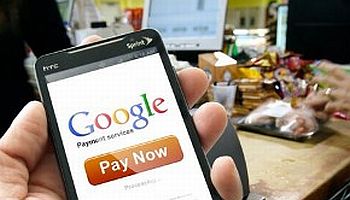

In the US, Google has moved closer to launching its mobile payment service similar to those announced by O2 and Everything Everywhere in the UK.
Slated for a summer release, the company has teamed with Sprint and several payment providers on Google Wallet, a mobile-payment system that lets users pay for merchandise at retailers and restaurants with their smartphones. Google Wallet is a free mobile application that will let owners of Samsung Nexus S 4G smartphones from Sprint use their phone as a wallet at some 20 retailers and restaurants.
The system is enabled by near-field communication (NFC) technology, a short-range wireless technology that allows communications between sensors brought within close proximity. The technology is widely adopted in Japan, where consumers wave their mobile phones in front of NFC-enabled sales terminal at checkout counters.
Citi, MasterCard and First Data are enabling payment for Google Wallet, which will be available in New York and San Francisco in summer, Stephanie Tilenius, vice president of commerce and payments, said at a Google event.
Tilenius said that once the Wallet ecosystem is well in place, Google and its partners will rev up marketing programmes to lure consumers. The service will be launched in conjunction with Google Offers, the company’s new local deals service and a Groupon competitor.
Google Wallet will sync with a user’s Offers, allowing users to redeem those deals via NFC at participating SingleTap merchants, such as American Eagle, Macy’s and Subway, or by showing the bar code as users check out. It will initially support Citi MasterCard and a Google Prepaid Card, allowing users to tap their Nexus S 4G phone to pay wherever MasterCard’s PayPass mobile-payment service is accepted.
Google is planning to develop APIs that will enable integration with numerous partners. Eventually, Google envisions that boarding passes, tickets, IDs and keys could be stored in the Google Wallet.
NFC has yet to catch on in the US, with retailers slow to adopt the required readers and other infrastructure. Google and its partners aim to change that, looking to cash in on the expected 50 percent of NFC-enabled mobile phones they expect to see launched by 2014. Last November Eric Schmidt, then-CEO, waved around a smartphone he said was fitted with NFC technology.
Google expects that, over time, software developers will write mobile applications that take advantage of NFC. Google would then pair ads, as well as local deals and discounts, with these services.
In December, the company revealed the mobile device for the initial service would be the new Samsung Nexus S, running the Google’s Android 2.3 Gingerbread operating system. The operating system includes native support for NFC but requires a special controller from chip maker NXP to operate.
The Nexus S 4G smartphone, launched by Sprint earlier this month, carries the NXP chip. Google said it expects additional phones with NFC controllers to launch this year.
OpenAI chief operating officer Brad Lightcap to oversee international expansion as company consolidates lead in…
Chinese researchers publish details on device that could wreak havoc on undersea communications cables in…
Former Intel chief Gelsinger expands role at Gloo, becoming executive chairman and head of technology…
MEPs add to Commission pressure for second EU Chips Act amidst industry calls for renewed…
Smartphone maker Xiaomi reportedly raises about $5.5bn in Hong Kong share sale as it invests…
BYD's Qin L EV sedan starts at about half the price of Tesla's Model 3,…